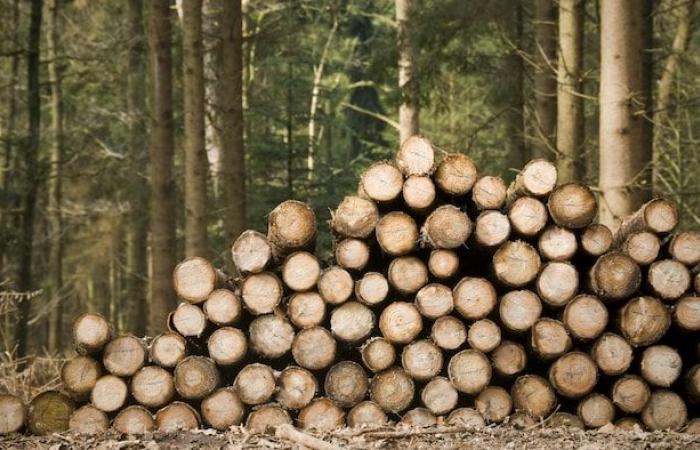The Legault government does not intend to laugh regarding possible leaks of information on the modernization of the forestry regime. Each party summoned by Quebec this fall, the list of which is equally secret, must sign a confidentiality agreement of indefinite duration and undertake to destroy government documentation upon request.
The Ministry of Natural Resources and Forests (MRNF) is conducting a meeting tour by invitation these days. They come at a time when Minister Maïté Blanchette Vézina promised to adopt a bill by the end of the current mandate of the Coalition Avenir Québec (CAQ).
According to a government document, of which - obtained a copy, the present meetings aim to present certain possible solutions to optimize the management of Quebec’s forests, in particular to enable adaptation to climate change and to ensure the sustainability of the forest
.
They follow the discussion tables on the future of the forest, held last winter. Quebec aims to submit its reform project at the beginning of 2025.
Open in full screen mode
Away from the public, Quebec is preparing a new forestry regime.
Photo: iStock / nicooud79
Ultra-confidential
However, a thick secret shrouds this ministerial initiative.
On the one hand, the ministry refuses to reveal who it is talking to. The list of partners who are met remains confidential
indicates the MRNF by email.
According to our information, Quebec limits each organization to one or two representatives. They would come in particular from the forestry industry, the municipal sector, environmental groups and First Nations.
On the other hand, the Legault government does not want to share the results of its thoughts with the general public at this time. The people consulted by Quebec are in fact required to sign a strict confidentiality commitment.
To avoid media leaks, each party invited by the MRNF must commit not to communicate the related information and, where applicable, the shared documents, to third parties, in any way whatsoever, except MRNFnor even inform anyone of their existence
we can read in the document that - was able to consult.
Open in full screen mode
The Minister of Natural Resources and Forests, Maïté Blanchette Vézina (Archive photo)
Photo: The Canadian Press / Jacques Boissinot
Quebec invites people to sound the alarm in the event of a breach of this agreement, and even to denounce those responsible. They must promptly notify the MRNF in writing of any breach of commitments […] for which he is responsible, of which he may have knowledge or of which he has reasonable doubts that it has been committed
.
There is also no question of keeping the documents that would be given to them during the meetings.
They must destroy the documents transmitted or delivered before, on the occasion of or after the meeting and, where applicable, the related information and ensure that no copy remains in any form whatsoever when the exchanges with the MRNF on their content will be completed or upon request.
These commitments have an indefinite duration, even if the ministry or minister were to publicly announce the content of the reform.
Moreover, [la personne signataire de l’entente] recognizes that the above commitments will continue, even if the related information and, where applicable, the shared documents, are made public by the MRNF.
Don’t slow down the process
According to various sources consulted by -, this way of doing things by Quebec would aim to save time for MRNF and to the Minister of Forests in her reform of the forestry regime.
According to a group invited to a meeting with ministry representatives this fall, the commitment would aim to prevent information from being transmitted to the general public and falling into the hands of the media.
We want to avoid to slow down the process
governmental. We were told that they [les gens du ministère] wanted to work on the bill rather than answer journalists’ questions
reports this group. Similar impressions were confirmed by other organizations contacted this week.

Open in full screen mode
Quebec’s forest covers an area of more than 900,000 square kilometers.
Photo : -
The MRNF defends himself.
Above all, he says he does this since the content of the reform is always an analysis
. Considering that he could still evolve or become more precise following the meetings, the Ministry of Natural Resources and Forests wishes that the discussions held remain confidential
.
The office of Minister Blanchette Vézina, for its part, confirms that it wants to avoid potential leaks. The objective is mainly to avoid, at this stage of the process, that the information shared during special meetings on the modernization of the forest regime is made public.
writes his office.
Unusual
These practices seem unusual.
We condemn the idea of proceeding in this way with confidentiality clauses. This is not an approach that has often been taken to consult interested parties
says Alain Branchaud, executive director of the Canadian Parks and Wilderness Society (SNAP Québec).
His organization participated in a meeting with the ministry and signed the confidentiality agreement. Mr. Branchaud deplores the fact that it is the only way
to obtain the content of the reform of the forest regime; content that he obviously could not comment on.

Open in full screen mode
Alain Branchaud, general director of the Canadian Parks and Wilderness Society, Quebec section
Photo: - / Laurent Boursier
Same story at Nature Québec. Alice-Anne Simard, general director of the organization, is not used to seeing this type of document. A document so strict
would even be a first.
The provincial and federal governments are accustomed to requesting a certain period of confidentiality the day before or a few days before an announcement, she said, but not for an indefinite period.
She doubts that such an agreement could be applicable, especially if Quebec announces the content of the new regime publicly.
First Nations refuse to sign
All First Nations and Inuit communities in Quebec received an invitation to private meetings of the MRNF. For their part, the confidentiality agreement simply did not go through. Putting together a united front, they refused to sign the commitment.
The various councils pleaded their obligation to consult their members who occupy the territory.
Quebec agreed to make an exception and will still hold the meeting with the First Nations. Confidentiality agreement no longer holds
confirmed the Assembly of First Nations of Quebec and Labrador.

Open in full screen mode
The woodland caribou is a culturally important species for certain indigenous communities. The forest regime will have an impact on its habitat and the rate of disturbance. (Archive photo)
Photo : Getty Images / Stan Tekiela Author / Naturalist
We understand that the representatives of indigenous communities and organizations who will participate in the meeting will wish to share a certain amount of information within the councils in order to play their role as representatives
indicates the office of the Minister of Forests regarding this exception.
The objective of the agreement was not to prevent this internal sharing or the circulation of information within the participating councils.










